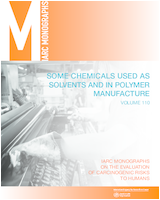NCBI Bookshelf. A service of the National Library of Medicine, National Institutes of Health.
IARC Working Group on the Evaluation of Carcinogenic Risks to Humans. Some Chemicals Used as Solvents and in Polymer Manufacture. Lyon (FR): International Agency for Research on Cancer; 2017. (IARC Monographs on the Evaluation of Carcinogenic Risks to Humans, No. 110.)
6.1. Cancer in Humans
There is limited evidence in humans for the carcinogenicity of dichloromethane. Positive associations have been observed between exposure to dichloromethane and cancer of the biliary tract and non-Hodgkin lymphoma.
6.2. Cancer in experimental animals
There is sufficient evidence for the carcinogenicity of dichloromethane in experimental animals.
6.3. Overall evaluation
Dichloromethane is probably carcinogenic to humans (Group 2A).
6.4. Rationale
The overall evaluation of Group 2A was based on sufficient evidence in experimental animals and limited evidence in humans. In addition, a Group 2A evaluation was also supported by sufficient evidence in experimental animals, and the strong evidence that the metabolism of dichloromethane via GSTT1 leads to the formation of reactive metabolites, that GSTT1 activity is strongly associated with genotoxicity in vitro and in vivo, and that GSTT1-mediated metabolism of dichloromethane occurs in humans.
- Evaluation - Some Chemicals Used as Solvents and in Polymer ManufactureEvaluation - Some Chemicals Used as Solvents and in Polymer Manufacture
Your browsing activity is empty.
Activity recording is turned off.
See more...
